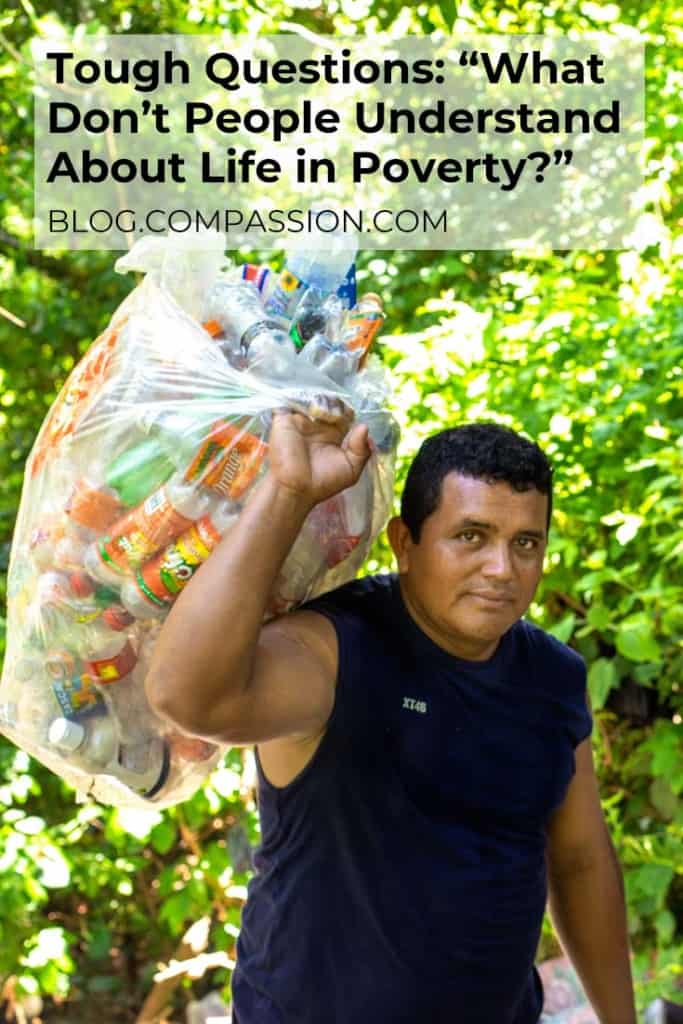This is the final article in a five-part series answering tough questions people ask about poverty. (Read the previous post.) We put five difficult questions to parents of children in Compassion’s program. In vulnerably sharing their experiences, they hope to break the stigma and reveal the truth about life in poverty.
Tough Question 5: “What don’t people understand about life in poverty?”
Poverty Affects Relationships
In Uganda, Olive smiles as a neighbor invites her to a family member’s wedding. But secretly, her heart sinks. She doesn’t own clothes nice enough for the occasion. These days, food is more important than fashion. She hates that her absence will make her look rude. It’s too embarrassing to explain, though.
“When you feel you are stigmatized because of poverty, you tend to isolate yourself. You don’t want to interact with other people because you feel you are not a person like others,” she says.
Devaki, a mother in Sri Lanka, agrees. “When we are invited for ceremonies and parties we do not go because we do not have nice clothes to wear for those occasions,” she says. “Our family and relatives do not respect us and they do not even come to our house. All of this affects us emotionally.”
Pride Is Set Aside
Orlando will never forget his first week working as a scavenger in El Salvador. He searched trash piles for metal, plastics, electronics — anything he could sell to the recyclers. The smell he grew used to, but the judgment was harder to ignore.
“At first it was embarrassing. People came out of their houses and stared at me, asking why I was poking around the trash,” he says. “Many acquaintances at first looked down on me for poking around the trash. They made bad faces like they were disgusted by me. I just bowed my head and tried not to see them because it made me feel bad.”
It’s Hard to Imagine a Different Future
When her family was at their most desperate, Olive couldn’t see a way out of poverty. Each day, she woke with one thing on her mind: finding food for her children.
“When someone is in absolute poverty, the reason they fail to plan is because they see nothing they can plan for. But if supported and helped, some people can get out of poverty,” she says.
“Since we joined the program, I feel I am better than I was because now I can think, and I also own something, and I can plan. Before this, I would only think about the daily food to feed my family.”
You Face Impossible Decisions
Olive regularly had to choose between providing food or water to her children. “We don’t have easy access to water so the days I fetch water, I cannot work. Many of us cannot afford [to pay for water] so we walk to the mountain and fetch water from a cave. We leave home at 6 a.m. and reach it at 12 p.m. Descending is easier, so the walk back only takes three hours. This water lasts us for two days.”
In Sri Lanka, a medical diagnosis placed Devaki’s family in a difficult situation. “When my husband had tuberculosis, he was told to sleep in another room so he didn’t pass it to the children,” she says. “We do not have a separate area, so he had to sleep outside under a tree for two weeks.”
Learning to Trust in God
Every night, Orlando and Consuelo gather their children and give thanks to God because they have eaten. But there have been many occasions when their plates were empty, their stomachs growling, and Orlando said grace anyway. “It is hard to do,” he says. “But we know we depend absolutely on him and must give thanks to him always.”
Consuelo agrees. “You live holding God’s hand,” she says simply. “He always helps us to move forward.”
Life in poverty often makes families feel marginalized and misunderstood. Let’s share the truth about their reality and highlight their bravery, sacrifice and resilience. While these families have endured immense challenges, they no longer face poverty alone. Each family is supported by a loving team at their local child development center who understands their realities because the team members live in the community too.
A caring sponsor’s prayers and encouraging letters help counter feelings of self-doubt so children can dream big. Educational support means children are in school, while mentoring and tutoring helps them set goals and pursue them. Nutrition and medical care keep the children’s bodies healthy, while the chance to learn about God’s love is transformational.
As Devaki says, “We are full of hope about our children’s future because of Compassion. Even though poverty has caused us many hardships, we have hope that we will come out of poverty and poverty will not stay with us.”

